Macaws are stunningly beautiful and intelligent birds that captivate the hearts of bird enthusiasts around the globe. Known for their vibrant plumage, playful nature, and ability to mimic speech, these majestic parrots have become one of the most sought-after exotic pets. However, owning a macaw is not a decision to take lightly. These birds require significant financial, emotional, and time investments, making it essential to understand the full cost of ownership.
This comprehensive 2025 Macaw Price Guide will explore not just the purchase price but also the long-term costs, care needs, and tips to help you make an informed decision about adding a macaw to your family.
1. Initial Cost of Buying a Macaw
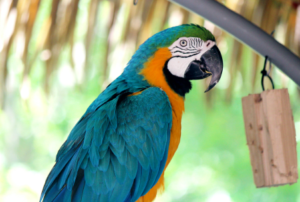
The first and most noticeable expense when owning a macaw is the upfront cost of purchasing the bird. Prices vary significantly depending on the species, age, rarity, and source (breeder, pet store, or rescue).
Popular Macaw Species and Their Costs
Blue and Gold Macaw: $1,500–$3,500
- These macaws are among the most popular and beloved for their stunning blue and yellow feathers and friendly demeanor.
Scarlet Macaw: $2,000–$4,000
- Known for their striking red, yellow, and blue coloration, scarlet macaws are a favorite for their beauty and outgoing personalities.
Green-Winged Macaw: $3,000–$5,000
- These large, vibrant macaws are known for their calm and gentle temperament, making them ideal for experienced bird owners.
Hyacinth Macaw: $10,000–$15,000+
- The largest and rarest of the macaw family, the Hyacinth Macaw’s breathtaking cobalt-blue feathers and affectionate nature command a premium price.
Military Macaw: $1,500–$3,000
- These medium-sized macaws are loved for their olive-green feathers and sociable personalities.
Mini Macaws (e.g., Hahn’s Macaw): $800–$2,000
Smaller in size but just as intelligent and lively as their larger counterparts, mini macaws are ideal for those with limited space.
Factors Influencing Macaw Prices
- Species Rarity: Rare macaws, like the Hyacinth Macaw, are significantly more expensive due to their limited availability.
- Age of the Bird: Younger macaws (chicks) tend to cost more than older birds. Unweaned chicks are the most expensive because of their potential lifespan.
- Breeder Reputation: Established breeders often charge higher prices due to their expertise, selective breeding practices, and care for the birds.
- Location and Demand: The price of macaws can vary by region based on local demand and availability.
2. Long-Term Costs of Owning a Macaw
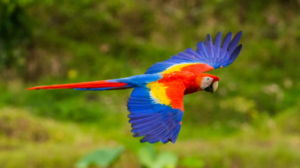
While the purchase price of a macaw is a significant investment, the long-term costs of care and maintenance can add up quickly. Here’s a breakdown of what to expect:
A. Housing Costs
Cage: $500–$2,500
- Macaws require large cages to accommodate their size and activity level. A good macaw cage should be at least 36x48x60 inches with sturdy bars to withstand their powerful beaks.
Accessories:
- Perches: $30–$100 (natural wood is recommended).
- Bowls and Feeders: $10–$50.
- Toys: $50–$200 per month. Macaws are highly intelligent and need constant stimulation to prevent boredom.
B. Dietary Costs
Pellets: $30–$50 per month
- High-quality pellets are the foundation of a macaw’s diet.
Fresh Fruits and Vegetables: $20–$40 per month
- Macaws require a variety of fresh produce, including apples, carrots, kale, and berries, for a balanced diet.
Treats: $10–$20 per month
- Nuts and seeds, such as almonds and sunflower seeds, are excellent occasional treats.
C. Veterinary Care
Initial Checkup: $100–$300
- A full health assessment by an avian vet is essential after bringing your macaw home.
Annual Wellness Exams: $100–$300 per year
- Routine checkups help monitor your macaw’s health and prevent potential illnesses.
Emergency Care: $500–$1,500+
- Macaws are prone to respiratory infections and other health issues, which can result in unexpected vet bills.
D. Grooming and Maintenance
- Wing Clipping (optional): $20–$40 per session.
- Nail Trimming: $20–$50 per session.
- Bathing Supplies: $10–$30.
E. Other Costs
- Training and Socialization Classes: $200–$500 (if required).
- Pet Insurance: $10–$50 per month.
3. Time Commitment and Emotional Investment
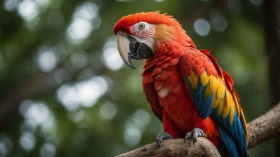
Macaws are social and intelligent birds that require daily attention and mental stimulation. They can live for 50 to 80 years, meaning owning a macaw is a lifelong commitment.
Time Investment
- Daily Interaction: 2–4 hours of quality time, including play, training, and bonding.
- Enrichment Activities: Frequent toy rotation and games to keep their minds engaged.
Emotional Costs
Macaws form deep bonds with their owners and may become depressed if neglected. They can also develop behavioral issues, such as screaming or feather-plucking, if their needs aren’t met.
4. Adopting vs. Buying a Macaw
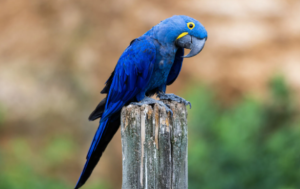
Adopting a Macaw
- Cost: $500–$1,500
- Pros: Lower initial cost, often includes health checks.
- Cons: Adopted birds may have behavioral issues due to past trauma.
Buying a Macaw
- Cost: $1,000–$15,000+
- Pros: Choose the species, age, and temperament.
- Cons: Higher upfront costs and responsibility for training.
5. Tips for Potential Macaw Owners
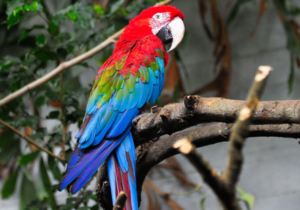
- Research Thoroughly: Understand the specific needs of the macaw species you’re interested in.
- Budget for Unexpected Costs: Always have a financial cushion for emergencies.
- Provide a Stimulating Environment: Invest in toys, puzzles, and activities to keep your macaw entertained.
- Find a Reliable Avian Vet: Build a relationship with a vet who specializes in exotic birds.
Conclusion
Owning a macaw is a rewarding but costly endeavor. From the initial purchase to the ongoing expenses, these birds require substantial financial, emotional, and time commitments. This 2025 Macaw Price Guide ensures you’re well-prepared for what lies ahead.
While the costs may seem daunting, the joy of sharing your life with a macaw—a bird known for its intelligence, beauty, and personality—is priceless. With proper care, these incredible companions will brighten your life for decades.
